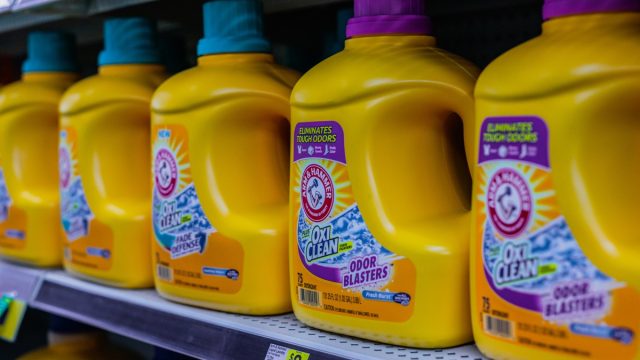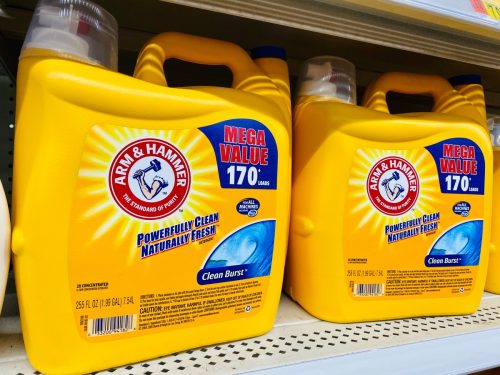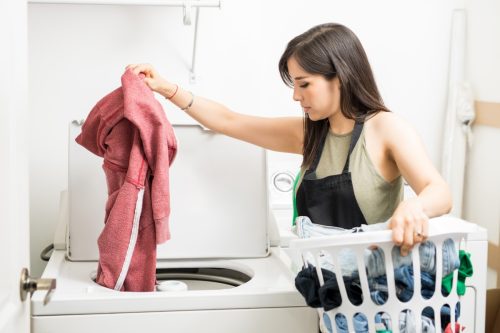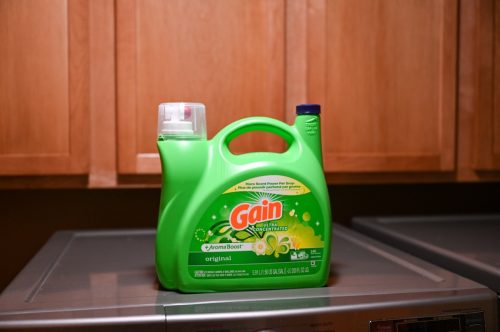Arm & Hammer Laundry Detergent Contains “Probable Human Carcinogen,” New Lawsuit Alleges

Arm & Hammer is one of those age-old brands families have relied on for generations, first for baking soda and later for personal care, cleaning, and laundry products. The brand introduced phosphate-free laundry detergent to its lineup back in the 1970s, and in the ’80s, Arm & Hammer became the first company to launch detergent with baking soda. Today, Arm & Hammer detergent is a household staple, but if it’s on your shopping list, you may want to think twice. A new lawsuit claims one product contains a “probable human carcinogen.” Read on to find out more about the allegations.
READ THIS NEXT: Gain Laundry Detergent Contains “Probable Human Carcinogen,” New Lawsuit Alleges.
The lawsuit claims that misleading marketing tactics are in use.

On April 3, Akili Charles, a resident of New York, filed a lawsuit against Church & Dwight Co. Inc., which owns the Arm & Hammer brand. In the lawsuit, Charles states that Arm & Hammer Clean Burst laundry detergent is marketed as being “Powerfully Clean,” “Naturally Fresh,” and “The Standard of Purity,” using a “blue cresting wave” image to insinuate cleanliness.
The lawsuit goes on to claim that these phrases and images are a form of “greenwashing”—a marketing tactic used to make products appear more environmentally friendly, thus appealing to an eco-conscious audience.
Charles notes that research has found that greenwashing relies on “nature-evoking images” to appeal to customers’ respect for nature, thus giving them a better impression of the brand overall.
But beyond misleading advertising tactics, Charles’ lawsuit claims that Arm & Hammer detergent may be detrimental to your health.
A harmful chemical isn’t listed on the packaging.

The lawsuit, which was filed in the U.S. District Court for the Eastern District of New York, alleges that Arm & Hammer Clean Burst detergent contains 1,4-dioxane (dioxane), which is classified as a “probable human carcinogen” by both the National Institutes of Health (NIH) and the U.S. Environmental Protection Agency (EPA).
Dioxane is formed in laundry detergent due to the addition of ethylene oxide, which reduces skin irritation caused by other ingredients, the lawsuit states. The chemical is known to accumulate in the body, with exposure occurring through inhalation, by consuming contaminated water, or via skin absorption, the complaint states. This has been connected to tumors in the liver, gallbladder, nasal cavity, lung, skin, and breasts.
The chemical cannot be seen with the naked eye, however, the lawsuit claims that dioxane presence in Arm & Hammer detergent was confirmed via independent testing by Bureau Veritas last year. Charles further alleges that Church & Dwight Co. “received notice and should have been aware of these issues due to complaints by third-parties,” but still fails to list the chemical on the bottle.
“Despite the claim to purity, ‘Clean Burst’ and bright blue wave, nowhere on the packaging does it disclose the presence of dioxane,” the suit reads. Best Life reached out to Church & Dwight Co. for comment on the lawsuit, and will update the story upon hearing back.
RELATED: For more up-to-date information, sign up for our daily newsletter.
Dioxane threatens the environment, too.

In addition to potentially upping your cancer risk, dioxane also has detrimental effects on the environment, Charles’ complaint states. It contaminates drinking water via these laundry detergents, which are washed down the drain into aquifers that contain groundwater.
Sewage and septic systems aren’t always equipped to filter dioxane out, making it “a persistent long-term threat to water resources.” New York state has banned laundry detergents that exceed a certain level of dioxane, but Charles claims that existing damage can’t be undone.
“To the extent the product may have taken belated efforts to prevent contamination with dioxane or sought waivers to continue selling it as is, any changes will be unable to reverse or biodegrade the dioxin already present within the state,” the complaint reads.
Arm & Hammer isn’t the only detergent currently facing backlash.

Charles claims the company is guilty of fraud and unjust enrichment, and is also in violation of the Magnuson-Moss Warranty Act, New York state consumer fraud acts, and the New York General Business Law.
The allegations are similar to a separate lawsuit filed last month. Darlene Hangen-Hall of Buffalo, New York, filed the class action suit against The Procter & Gamble Company, which manufactures Gain detergent, claiming that the company greenwashes Gain Original Aroma Boost—which also contains dioxane.
Procter & Gamble “manufactures and sells Gain laundry detergent in packaging replete with natural elements, like stylized flowers, leaves, butterflies and ‘an intensive use of the color green,'” the lawsuit states. However, much like with Arm & Hammer detergent, Hangen-Hall asserts that the products are actually misrepresented due to the presence of dioxane.